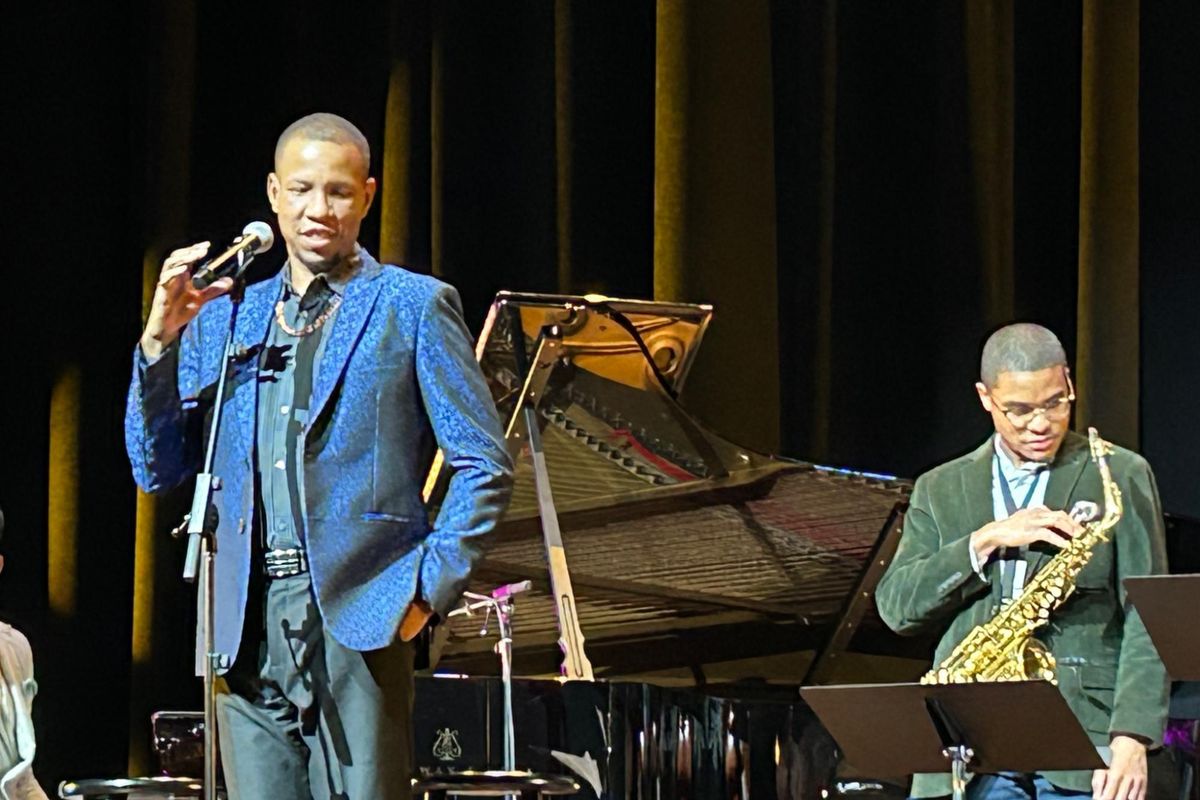Music has been a part of Atlanta-raised Chicagoan Milton Suggs’ environment his entire life. A vocalist currently touring with the Jazz at Lincoln Center ensemble, their latest tour kicked off at the Myrtle Woldson Performing Arts Center on Thursday, Jan. 22.
“I’ve practiced music from a young age. I started in third grade, on the upright bass (and played in) the school orchestra. Then I transitioned to other instruments, such as the saxophone, a brief stint for like one year,” Suggs said.
He participated in his high school’s marching band and later, as a freshman at Florida A&M University, made the pivotal decision to pursue music as his calling and career.
Music runs in Suggs’ bloodline. Both his father and grandfather, both whom he is named after, were musicians. His father, Milton Suggs Jr., performed with jazz legends such as Mary Lou Williams and even appeared on an episode of “Mister Rogers’ Neighborhood” in 1973, playing the bass.
“I come from a family of conscious thinkers who actively participated in the Black Arts Movement of the ‘60s and ‘70s,” Suggs said, citing the influence of poet and educator Haki Madhubuti and his late uncle, Rev. Clarence James, who worked with Dr. Martin Luther King Jr. during the Civil Rights Movement. “They were invested in the spiritual upliftment and the liberation of our people.”
Suggs sees music as a profound tool for self-discovery, emotional expression, and cognitive stimulation.
“You see musicians who have practiced all their lives, and they live into their eighties and their nineties. Musicians like Marshall Allen, who’s a hundred now, and he’s still putting out new music,” he said.
According to Suggs, music opens neural pathways and touches different aspects of our being. That spark of creativity, he explains, is what sustains musicians throughout their journey. But this spark must be accompanied by discipline to reach the heights of one’s potential.
“Love is great; it’s necessary. But it only goes so far. Love doesn’t necessarily make you get out of bed … sometimes you have to push yourself. Love doesn’t automatically translate into discipline.”
For Suggs, becoming your most authentic self in any endeavor requires consistent practice and effort. He also underscores the communal aspect of music, comparing it to the interplay of harmony and synergy.
“There are times when you hone your skills by practicing alone, but there is a communal aspect to being a musician, and that is how you establish harmony,” he said.
Music, in this sense, validates our identity, our experiences, and our shared humanity.
“A lot of times, there’s an innate ability that many of us have, and it communicates a spiritual existence on Earth so that we can tarry through, I guess you might say, certain seasons of life. Culturally, as Black people, (music) has been a tool for our liberation. It’s how we have communicated with each other, how we have resisted, and how we have fought back.”
To Suggs, the purpose of music transcends entertainment; it is sacred. It serves as an expression of the soul and a means to resist injustice. Throughout Black history, music has been an essential force in both spiritual and social liberation. Suggs honors this legacy by looking to the past for inspiration while carving his own path forward. He acknowledges that the struggles of previous generations resonate in the creative process today.
“There’s a reason we have that impulse to create,” he said. “Music is intangible. It’s something that we’ll always have access to. As long as you have a voice or hands, you’ll have access to making music. It’s a tool that cannot be bound.”
Suggs also advocates for the value of arts in education, believing children will naturally create but will thrive with proper guidance and opportunities.
“It’s something that will continue to stimulate our minds so that these other academic pursuits can grow on a higher level,” he said.
For Suggs, art is essential to fostering a holistic sense of self. He further emphasizes the importance of creating spaces for artistic expression outside traditional educational institutions.
The capacity of music to heal, inspire, and unite is an enduring testament to its heritage and power. As Suggs continues to share his talents with audiences worldwide, his work reflects a deep commitment to the ascension of his people through the transformative power of music.
